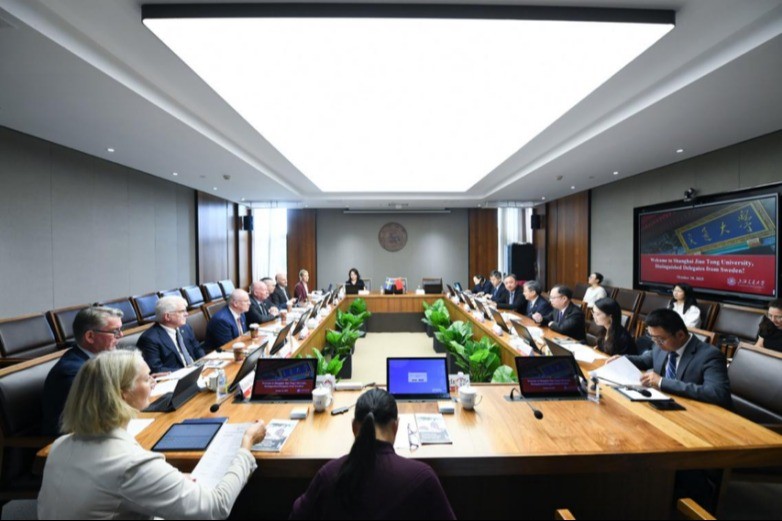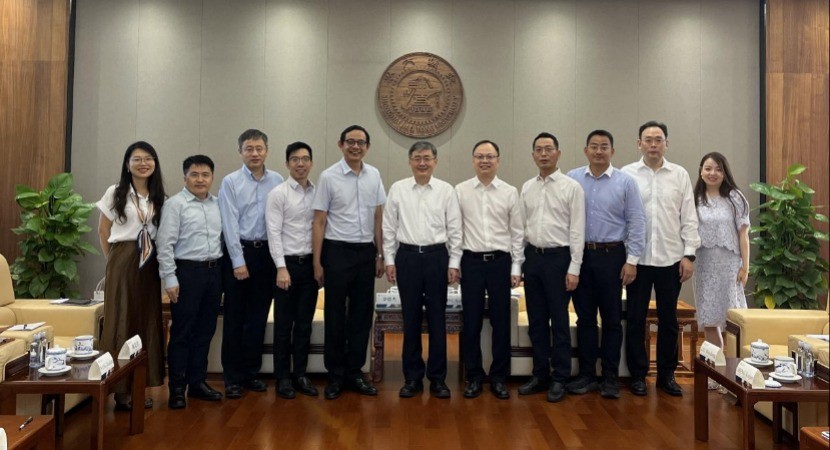From June 29 to July 5, 2025, Shanghai Jiao Tong University (SJTU) President and Academician of the Chinese Academy of Sciences Kuiling Ding led a university delegation to France and the United Kingdom. The visit focused on strengthening collaboration with key partner institutions in education, research, and talent development.
On the morning of June 30, the delegation visited ESCP Business School and held talks with President Léon Laulusa. The two institutions signed agreements on student exchange and dual degree programs. Both sides agreed to deepen cooperation in interdisciplinary education and better prepare students to meet the demands of a rapidly evolving global landscape.
That same afternoon, the delegation met with Thierry Coulhon, President of Institut Polytechnique de Paris (IPP); Christopher Cripps, Vice President; and Estelle Iacona, President of CentraleSupélec. The discussions mainly focused on future approaches to joint talent development. Both institutions committed to broadening two-way student exchanges and strengthening joint doctoral programs, particularly in engineering.
The next morning, the delegation visited KEDGE Business School and met with President Alexandre de Navailles. A memorandum of understanding was signed to expand their dual master’s degree programs and encourage both Chinese and French students to engage in short- and long-term exchanges, and consequently encourage cross-cultural understanding and global academic cooperation. Both parties also agreed to foster innovation, support entrepreneurship education, and jointly pursue research in important fields such as sustainable management and supply chain studies.

During the afternoon, the delegation visited Mines Paris – PSL and held talks with President Godefroy Beauvallet. Similar to the previous meetings, both institutions agreed to strengthen faculty collaboration, enhance resource sharing in education, and support short- and long-term student exchanges. Additionally, the institutions held in-depth discussions on launching a joint doctoral program.
On July 2, the delegation visited Imperial College London and met with President Hugh Brady. During the meeting, both parties repeatedly emphasized their strong partnership and common vision for interdisciplinary research and integrated academic development. The subsequent discussions mainly focused on carbon neutrality and sustainable development. Resulting action items include stronger collaboration across departments and alumni networks, as well as exploration of different models of multilateral cooperation in order to expand pathways for global scientific collaboration.
Afterwards, the delegation also visited King’s College London and held meetings with President Shitij Kapur and Vice President Bashir M. Al-Hashimi. The meetings involved discussions surrounding academic and research collaboration in psychology, as well as the implementation of integrated bachelor’s-master’s programs in engineering and the humanities. Furthermore, both parties committed to providing more innovation opportunities, expanding entrepreneurship education, and broadening the scale of student exchanges. Following the discussions, the delegation toured teaching and laboratory facilities.
Later that afternoon, the delegation also visited University College London (UCL) and met with President Michael Spence and Vice-Provost Geraint Rees. A university-level cooperation agreement which builds on their existing joint research fund. Both parties agreed to continue accelerating the development of engineering programs and explore joint teaching initiatives in clean energy—further strengthening their existing partnership.
On July 3, the delegation visited the University of Glasgow and met with Vice-Principal Rachel Sandison. In a manner similar to the meetings that took place the past couple of days, a memorandum of understanding was signed. This agreement indicates that moving forward, both parties will prioritize collaboration in the field of bioengineering. As key members of the Universitas 21 alliance, the two institutions plan to leverage the network’s resources to drive both bilateral and multilateral cooperation, which also includes joint development of international online courses. Afterwards, the delegation held discussions with representatives from the university’s School of Engineering to jointly map out concrete plans for the future.
This multiday visit has strengthened SJTU’s partnerships with leading European institutions in France and the UK. The agreements signed during this period of time marks a significant step forward in building a global network for education and research, and in cultivating globally minded, interdisciplinary talent.



